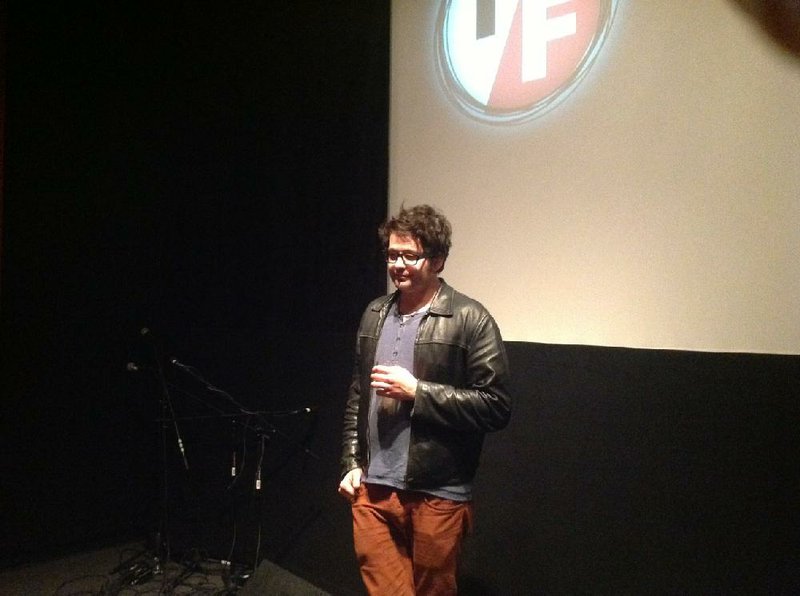Finding the right subject for a documentary can be a daunting task, but according to co-director and co-producer Maxim Pozdorovikin, being at the right place at the right time helped.
He was in the Russian capital last year, and his new film, Pussy Riot - A Punk Prayer, on which he shared producing and directing duties with Mike Lerner, covers the bizarre trial for “hooliganism” against three members of the performance art and music collective Pussy Riot.
Pozdorovikin will be on hand to present the film at the Little Rock Film Festival at 8:30 p.m. Saturday at the Argenta Community Theater and 4 p.m. Sunday at the Historic Arkansas Museum.
“I really wanted to capture that period in Moscow, but it’s also such a fascinating story,” the Russian-born, New York based filmmaker said. “One of the fascinating things … is the kind of public debate that it generated. But it’s also such an epic human story when you watch what the women go through during the time and how they handle it.”
Nadezhda “Nadia” Tolokonnikova, Ekaterina “Katia” Samutsevich and Mariya “Masha” Alyokhina performed an unannounced (and rather profane) concert on Feb. 21, 2012, that criticized the close relationship between the Russian Orthodox Church and the regime of President Vladimir Putin.
Tolokonnikova and Alyokhina are currently serving two-year prison sentences, while Samutsevich’s sentence has been suspended after seven months.
But the three women might not have faced legal trouble if they performed anywhere but the Christ the Savior Cathedral, which had been demolished by the Soviets in the early 1930s and wasn’t rebuilt until the 1990s. Given the history, its not surprising that Orthodox Christians would feel threatened by perceived attacks on their faith.
Amnesty International, Sting, Yoko Ono and Madonna have called for the release of the remaining members of the group. While the trial and the prosecution have been condemned in Europe and the United States, Pozdorovikin says that most Russians believe the charges and the punishment were fair.
“It’s a very high percentage,” he says. “There are different polls, and some of them aren’t that trustworthy. The sentiment was amplified, but it was also very real.”
At the same time, Pozdorovikin says the band expressed the grievances - particularly issues of free expression and women’s issues - of millions of Russians, and crowds of supporters and detractors of the suspects protested during the trial.
“We [in the West] can agree the punishment was harsh and unnecessarily punitive, but there are also fascinating debates the story provokes. They’re not martyrs, and they don’t see themselves as such. They’re just, really, risky artists.”
Some of Pussy Riot’s activities involve more than simply putting on gaudy, colorful dresses and ski masks. A pregnant Tolokonnikova took part in a public orgy (shown in the film) at a museum.
He adds, “They’re a lot more radical than most people realize. They’re very serious contemporary artists. To be true to them, vulgarity is part of their message. But with Pussy Riot, they’ve touched on the issue of church and state, which is something people hadn’t really been thinking about until they started talking about it.
“In general, the notion of religious sentiment forced in the political situation is rather new to Russia. In America, we’ve gotten used to talking about the way that, let’s say certain religious communities [affect] voting, how the religious right determine how certain issues have political weight, obviously with abortion.”
Because the situation with Pussy Riot has been so sensationalized abroad, Pozdorovikin says many Russians have a distorted picture of how the dispute with the performance activists has played out. When asked how he has been able to present a more nuanced and detailed discussion, he replies, “It helps that I’m Russian.”
He adds, “In the West, they’re just seen as a punk band that performs a song against Putin. They’re really not a punk band [the music they bellow and dance to is usually prerecorded]. They’ve done many songs against Putin before. And they’re despised for it. In Russia, on the mass media, they’re discussed in religious terms. They did this naughty thing and got punished for it. The truth is a fascinating middle ground between those two. ”
MovieStyle, Pages 33 on 05/17/2013

